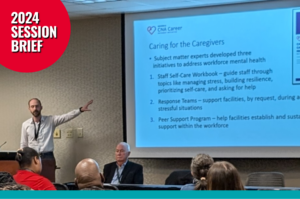 By Alexis Ware
By Alexis Ware
The 13th annual State of the Public’s Health Conference, held at the Georgia Center for Continuing Education in Athens on Thursday, Oct. 24, featured guest speakers Dr. Patrick O’Neal and Austin Dobbs, who spoke during a breakout session about Georgia’s immediate need for more certified nursing assistants (CNAs).
In a time when caregivers play an increasingly vital role in the US healthcare system, Georgia faces a significant shortage of CNA workers. With 1.2 million Americans residing in nursing homes as of 2023, and 70% of adults aged 65 or older requiring long-term care, it is imperative that researchers and investors take action to address this issue.
Organized by the School of Public Health at the University of Georgia, the conference offered a way for O’Neal and Hobbs to propose a gratification for this need by highlighting the Georgia CNA Career Pathway Initiative, a program designed to increase and support CNA workers. The two also discussed the Georgia Long-Term Care Networking Initiative, which connects individuals with long-term care facilities for training and employment.
Hobbs explained how, in addition to the marketing campaign, the program used a targeted campaign to recruit new caretakers.
“They did a little bit of research about what specific groups would make great candidates to be CNAs,” said Dobbs, member of the UGA Institute for Disaster Management. “And then, ‘How can we specifically target those groups to try to bring them into the field?’”
According to Hobbs, these groups include high school and technical college students, as well as military spouses who move regularly and need a job that travels with them. The program also seeks to bring UGA students studying healthcare within the CNA fold.
The program’s online, asynchronous continuing education trackers help with professional growth and provide course credits to trainees. Another way the program supports future CNAs is by providing resource kits. The Respiratory Program Resource Kit offers trainees a fit test kit that ensures they receive accurate testing to keep staffers healthy. CNAs can then go on to become certified nursing assistants (CMAs) through the CNA to CMA Training Program.
When asked how staff will encourage people to complete the program, Hobbs was clear about the eminent path Georgia must take.
“If you can get facility leadership to get behind the mission of the workbook and the peer support, and you can get them behind why it’s important, then they can help rally people to do it to help them see that this is more than just a task,” Dobbs said.
